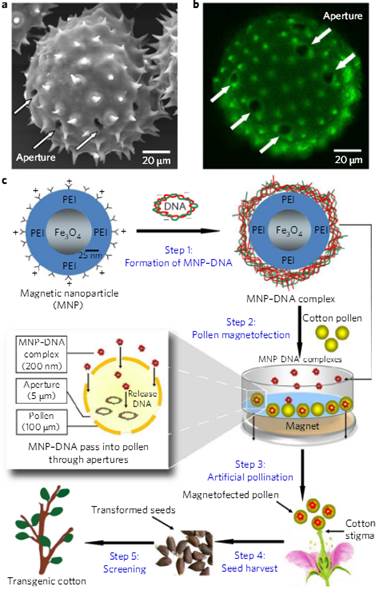我国科学家创立高效便捷植物遗传转化新方法

11月27日,《自然-植物》(Nature Plants)杂志在线发表了中国农业科学院农业环境与可持续发展研究所与生物技术研究所科研团队的一项联合研究成果。他们利用磁性纳米粒子作为基因载体,创立了一种高通量、操作便捷和用途广泛的植物遗传转化新方法,推动纳米载体基因输送与遗传介导系统研究取得了重要进展,开辟了纳米生物技术研究的新方向。
发展高效、安全的新型遗传转化方法,一直是基因工程、分子生物学和遗传育种等领域的研究热点之一。传统的植物转基因方法,通常需要比较繁杂的组织培养等植物再生程序,才能获得转基因植株,尤其像诸如棉花等难再生作物的转基因植物制备更加困难。
此次研发的基于磁性纳米颗粒基因载体的花粉磁转化植物遗传修饰方法,可以利用磁性纳米颗粒Fe3O4作为载体,在外加磁场介导下将外源基因输送至花粉内部,通过人工授粉利用自然生殖过程直接获得转化种子,然后再经过选育获得稳定遗传的转基因后代。
论文共同第一作者、 环发所赵翔博士告诉记者,该方法将纳米磁转化和花粉介导法相结合,克服了传统转基因方法组织再生培养和寄主适应性等方面的瓶颈问题,可以提高遗传转化效率,缩短转基因植物培育周期,实现高通量与多基因协同并转化,适用范围与用途非常广泛,对于加速转基因生物新品种培育具有重要意义,并在作物遗传学、合成生物学和生物反应器等领域也具有广泛应用前景。
该研究成果得到了国家转基因重大专项课题、国家“973”计划项目和中国农科院科技创新工程等经费资助。论文共同第一作者还有环发所王琰博士和生物所孟志刚博士,环发所研究员崔海信和生物所研究员张锐为共同通讯作者。(来源:科学网)
Pollen magnetofection for genetic modification with magnetic nanoparticles as gene carriers
Abstract Genetic modification plays a vital role in breeding new crops with excellent traits. Almost all the current genetic modification methods require regeneration from tissue culture, involving complicated, long and laborious processes. In particular, many crop species such as cotton are difficult to regenerate. Here, we report a novel transformation platform technology, pollen magnetofection, to directly produce transgenic seeds without regeneration. In this system, exogenous DNA loaded with mag-netic nanoparticles was delivered into pollen in the presence of a magnetic field. Through pollination with magnetofected pollen, transgenic plants were successfully generated from transformed seeds. Exogenous DNA was successfully integrated into the genome, effectively expressed and stably inherited in the offspring. Our system is culture-free and genotype independent. In addition, it is simple, fast and capable of multi-gene transformation. We envision that pollen magnetofection can transform almost all crops, greatly facilitating breeding processes of new varieties of transgenic crops.
原文链接:https://www.nature.com/articles/s41477-017-0063-z.epdf?referrer_access_token=BPEImphd2eqmEOSbBt5WotRgN0jAjWel9jnR3ZoTv0POg1DLDK8Ju4lMlCW3LdbNKJyCeq8FQO9K6uljtX6zpz03PEtUs1vaP6vLGUVFDdxt2qNaXOrEY14Bb48GFIz6UPtQ2eQs48NiqdgOyydB_Qfa00YWm7OQ6z3tJAxl3uwQEMBxq_KXQdzueQc92vfxdFK1ReLDPM_i27H8lCMFEZmwcGQv0rTt3MZrNXUISM8%3D&tracking_referrer=news.sciencenet.cn

